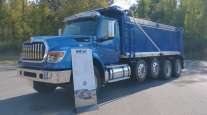Senior Reporter
Navistar Reports Drop in Fiscal Q3 Earnings

[Stay on top of transportation news: Get TTNews in your inbox.]
A near 50% decline in truck sales, caused by the impact of COVID-19 on the economy, resulted in Lisle, Ill.-based Navistar International Corp. reporting sharp losses in its fiscal third quarter.
Navistar’s net loss was $37 million, or 37 cents per share, compared with a profit of $156 million, or $1.57, in the same period a year ago.
On an earnings call with reporters and financial analysts on Sept. 9, the company also confirmed it is taking a minority interest in the San Diego-based automated truck company TuSimple, with the goal of producing a Level 4 autonomous truck by 2024. Terms of the agreement were not made public.

Level 4 automated driving means the technology can automatically steer, brake, accelerate and monitor the vehicle’s environment without relying on a human driver for backup or assistance, at least under certain conditions.
Regarding the earnings, Navistar’s leadership said the COVID-19 pandemic, and the resulting falloff in both new and used truck sales, severely hurt its production and finances during the quarter ended July 31.
Revenue plunged 45% to $1.67 billion compared with $3.04 billion in the same year-ago period.
The truck and engine maker’s quarterly revenue report fell below what investors on Wall Street were forecasting. Three analysts surveyed by Zacks Consensus Estimate expected $1.89 billion.
“Our fiscal third quarter opened during the middle of many stay-at-home orders and ended with sections of the economy beginning to reopen, and our results certainly reflect this,” CEO Persio Lisboa said. “While marketplace uncertainties continue, we are accelerating the pace of progress on our Navistar 4.0 strategy for financial improvement, so we can pull forward its benefits and take full advantage of a stronger industry when it arrives.”
Navistar’s 4.0 strategy lays out a plan to increase its long-term financial position by 2024 by growing market share, implementing a single platform strategy for research and development, and standardizing truck parts and tooling.
Another key is constructing a new truck assembly facility in San Antonio, which the company says will reduce logistics and manufacturing costs.
The company said construction has continued during the pandemic, and the facility is scheduled to open in early 2022.
Lisboa said it will be capable of building diesel and fully electric vehicles, and the first truck off the new assembly line will be electric.

What are fleets doing to help attract the best possible diesel technicians to join the changing workforce environment? Host Michael Freeze speaks with Ken Boyer, dean of the Auto/Diesel Institute at Baker College, and Ralph Romero, vice president of talent management at U.S. Xpress. Hear a snippet, above, and get the full program by going to RoadSigns.TTNews.com.
During the pandemic, as the economy slowed, Navistar reduced expenses to save cash and increase its liquidity. Company officials said the belt-tightening efforts are paying off. Navistar ended the third quarter with $1.6 billion of liquidity, including cash, marketable securities and cash equivalents, a $200 million improvement from Oct. 31, 2019. The additional money will help with the TuSimple deal and end its employee salary deferral program on Sept. 1, earlier than the company had planned. Navistar also cut its general and administrative expenses by 29% year-over-year, and using lessons it learned during the pandemic, the company said it will pursue additional cost savings.

Lisboa
In addition to the TuSimple announcement, Navistar said it had struck two other deals. It is forming strategic partnerships with fleet management solutions providers Samsara and Geotab to allow international customers to add to their choice of fleet management solutions to trucks without installing additional vehicle hardware.
As for electric trucks, Navistar signed an agreement with In-Charge Energy to provide charging infrastructure and consulting services to electric vehicle customers.
“As a result of the pandemic, we had the opportunity to revisit our investment portfolio and re-time noncritical programs, and cancel others,” Lisboa said. “By streamlining our investments, we were able to free up significant capacity, which is being redeployed into advanced technology programs and strategic partnerships that accelerate our pace of progress.”
Want more news? Listen to today's daily briefing:
Subscribe: Apple Podcasts | Spotify | Amazon Alexa | Google Assistant | More




